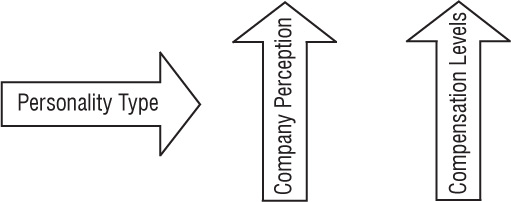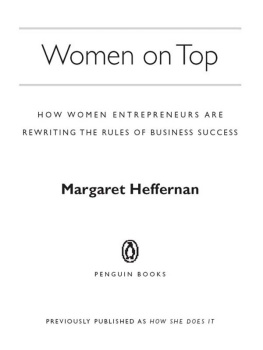RISE TO THE TOP
How Women Leverage Their
Professional Persona to Earn More
Stacey Hawley

All rights reserved, including without limitation the right to reproduce this ebook or any portion thereof in any form or by any means, whether electronic or mechanical, now known or hereinafter invented, without the express written permission of the publisher.
Copyright 2014 by Stacey Hawley
Edited by Kara Kumpel
Cover design by Joanna Williams Design
978-1-5040-2016-9
The Career Press, Inc.
220 West Parkway, Unit 12
Pompton Plains, NJ 07444
www.careerpress.com

Distributed by Open Road Integrated Media, Inc.
345 Hudson Street
New York, NY 10014
www.openroadmedia.com

To my mother, the woman who gave me
the greatest gift of all: courage.
Acknowledgments
Imagine climbing the corporate ladder. As a woman. Thirty years ago. Painful, humiliating, lonely, rewarding, eye-opening, commendable, and brave are a few words that come to mind.
Many of todays opportunities exist because of courageous trailblazers. It is impossible to truly understand the frustrations and obstacles faced by the women who created the abundant opportunities available today. Thank you to the thousands of powerhouse personalities who pave the way for other women every day. These women constantly encourage me to grow, lead, and persevere, either through example or instruction. Thank you for opening the doors for other women to forge their career paths and rise to the top.
My personal life has been filled with amazing powerhouse personalities who taught me to persist. My grandmothers and mother immigrated to the United States from Greece to create a better life for their families. My mother was the first child in her family to attend college, and, even more courageous, attended school in her 30s while raising two kids because she wanted to pursue a new career. I am also grateful for my mother-in-law, my godmother, aunts, and sisters who are blazing their own trails for themselves and for others to follow.
Friends are a powerhouses best support system. I have been blessed with two dear women who support and challenge me in both my professional and personal life. Their unwavering support undoubtedly led to this books creation. Thank you, Melissa and Chris, for not allowing me to give up, for challenging me, and for always supporting me.
Growing up at Towers exposed me to many amazing professionals. Thank you to Adrienne, who taught me it is just as important to learn what not to do as it is to learn what to do, and Rob, who shared the best piece of advice ever: If you believe something of yourself, that is how others will perceive you. Perception is 90 percent of reality. And thank you to Linda, my work mom who took me under her wing and helped me understand the different powerhouses in our own company.
Every client I met and worked diligently to help succeed became a true friend for me. I learned from each womans experiences, leadership, and wisdom. Specifically, thank you Pat and Sharon for unknowingly being my mentors and role models. I documented and imitated everything you shared and taught.
This book is a labor of lovea manifestation of my passion to share with women everything I have learned about pay to help them succeed. Robin shared this passion with me and helped promote my passion. Thank you, Robin.
Finally, I have been blessed to marry a true partner and friend. He allows me to try, try, and try some more, encourages me to succeed, and also shows me how to look at things in different ways and from different points of view. Thank you to my husband, Seanmy personal powerhouse.
Contents
Introduction
Perception is 90 percent of reality.
Unknown
If I asked you to estimate the annual base salary for a CFO position, what number would pop into your head?
$80,000?
$100,000?
$150,000?
What if I said the position is for a public company? What if I added that the company records more than $30 billion in revenues? Or that the company focuses on telecommunication services? Would your number escalate? (It should.)
$200,000?
$325,000?
$500,000?
$1,000,000??
Now what if I claimed the company was a privately held professional services firm with $1 billion in revenues? Did your number shrink? (Again, it should.)
Lets take this discussion further.
What if I added that the CFO (in any scenario) acts as a true business partner, performs exceptionally well, and is highly valued by the organization? Alternatively, how does your thinking change if the person is new to the role, only meets expectations, and may or may not be highly valued?
The purpose of this exercise was to show that compensation is both objective and subjective. The objective part involves industry peers, robust data, structures, and guidelines. The subjective partwhich highly influences the objective partis individual performance and perception. Performance is measured by achievement against goals, strategic impact to the organization, and how the individual is valued. This performance influence is based on individual perception, which determines the importance of the underlying performance (it isnt all linearthere is a range of gray). This perception then determines the individuals resulting compensation.
Think of it as a math formula:
Compensation = f(x), where f = performance and (x) = perception
Maximizing compensation comes down to:

I have witnessed firsthand how perception impacts compensation levels. As an executive compensation consultant, I partner with senior management and boards to develop compensation philosophies and peer groups, review and analyze data, and discuss how to use the data to determine pay levels. For almost two decades now I have worked with companies across many industries at various stages of growth to review, develop, and refine compensation programs. I am at the table. Watching. Listening. Answering questions. Advising. I am part of program discussions, observing how compensation decisions are made using the information that has been provided.
As objective as the process might try to be, there is still an element of subjectivity; individuals can influence the outcome. What I have learned, after almost 20 years of helping companies and individuals determine competitive and rewarding pay programs and levels, is that how you play the game matters. There is more to making money than just moving the ball down the field; how you move the ball matters. Even if you think you understand the value of a job (in other words, how much a job is worth), that doesnt mean you are going to get it. Just knowing the value isnt enough. You cant just ask for it. Other people need to believe you are worth it.
Over and over again, women have asked me what I have learned about negotiating pay and dealing with complex situations, and how to leverage my insights. So now I am sharing what I have learned with you. I believe that men are wired differently than women, and therefore play this game better than women. I also believe that women can learn to play the game better. After engaging in intense executive compensation discussions with CEOs, boards, senior leadership, and human resources professionals, I can recognize









